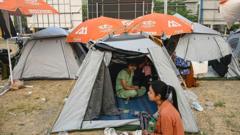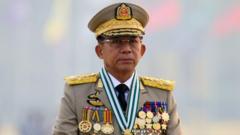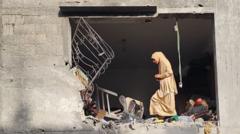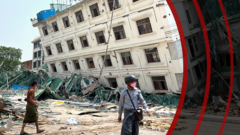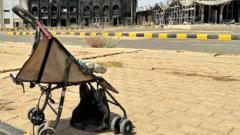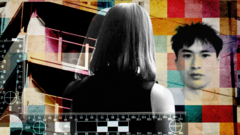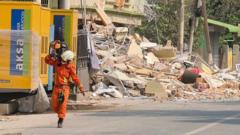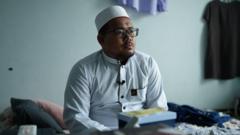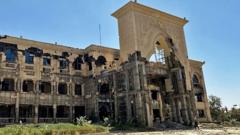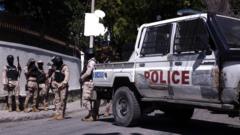The ongoing civil war in Sudan has prompted many families to escape to Libya, where they encounter severe mistreatment, including sexual violence and human trafficking. Personal accounts reveal a grim reality for women, who struggle with the dual burdens of displacement and abuse as they search for safety.
Sudanese Women Endure Horrific Abuse in Libya: A Cry for Help
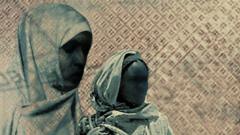
Sudanese Women Endure Horrific Abuse in Libya: A Cry for Help
Many Sudanese women fleeing violence at home face extreme abuse and exploitation after seeking refuge in Libya, illustrating the dire humanitarian crisis unfolding in the region.
In the shadows of Libya’s chaotic landscape, Sudanese women are grappling with harrowing experiences of abuse and violence after fleeing their war-torn homeland. Layla, who fled Sudan with her husband and six children, describes the trail of terror that followed her family during their desperate search for safety. Her narrative is one of many highlighted by the BBC, shedding light on how women are particularly vulnerable amidst the refugee crisis stemming from Sudan’s civil war, which erupted in early 2023.
The war has displaced over 12 million people and left 24.6 million in urgent need of food and aid. Many families, hoping for better prospects in Libya after facing hostility in Egypt, find themselves trapped in a cycle of exploitation. Layla's story is stark; after paying a trafficker to escape Sudan, her family was held captive and beaten.
Another woman, Salma, who was separated from her husband during her ordeal, describes being subjected to brutal treatment by traffickers. With her children also victims of violence, they were forced to live in appalling conditions, often scavenging for food. “Sometimes I wished we would all die together,” she confessed, revealing the depths of her despair.
Jamila recounted a similarly horrific experience, sharing that her daughters were repeatedly raped, while also facing societal prejudice for their race. Despite her attempts to report these crimes, the systemic failures in Libya’s justice system left them unprotected.
Hanaa's experience mirrors this bleak reality, as she was forcibly detained and subjected to relentless abuse at the hands of her captors. The pervasive culture of violence against women in Libya paints a grim picture, where even state-operated facilities fail to offer refuge.
International organizations like the UN have substantiated claims of widespread mistreatment and abuse within refugee detention centers in Libya. Reports have emerged detailing unlawful conduct, inadequate care, and systemic rape, particularly at institutions like Abu Salim prison.
Many women highlighted in these accounts express regret for their decision to pursue a supposedly safer life in Libya, revealing a tragic irony: the escape from war leads them into a nightmare of violence and degradation. “If only I had known what was awaiting me here,” reflects Salma, encapsulating the harrowing reality that many face as they navigate their plight for survival.
The plight of Sudanese women in Libya underscores the urgent need for a multifaceted response to protect vulnerable refugees and address the humanitarian crisis unfolding in the region.
The war has displaced over 12 million people and left 24.6 million in urgent need of food and aid. Many families, hoping for better prospects in Libya after facing hostility in Egypt, find themselves trapped in a cycle of exploitation. Layla's story is stark; after paying a trafficker to escape Sudan, her family was held captive and beaten.
Another woman, Salma, who was separated from her husband during her ordeal, describes being subjected to brutal treatment by traffickers. With her children also victims of violence, they were forced to live in appalling conditions, often scavenging for food. “Sometimes I wished we would all die together,” she confessed, revealing the depths of her despair.
Jamila recounted a similarly horrific experience, sharing that her daughters were repeatedly raped, while also facing societal prejudice for their race. Despite her attempts to report these crimes, the systemic failures in Libya’s justice system left them unprotected.
Hanaa's experience mirrors this bleak reality, as she was forcibly detained and subjected to relentless abuse at the hands of her captors. The pervasive culture of violence against women in Libya paints a grim picture, where even state-operated facilities fail to offer refuge.
International organizations like the UN have substantiated claims of widespread mistreatment and abuse within refugee detention centers in Libya. Reports have emerged detailing unlawful conduct, inadequate care, and systemic rape, particularly at institutions like Abu Salim prison.
Many women highlighted in these accounts express regret for their decision to pursue a supposedly safer life in Libya, revealing a tragic irony: the escape from war leads them into a nightmare of violence and degradation. “If only I had known what was awaiting me here,” reflects Salma, encapsulating the harrowing reality that many face as they navigate their plight for survival.
The plight of Sudanese women in Libya underscores the urgent need for a multifaceted response to protect vulnerable refugees and address the humanitarian crisis unfolding in the region.

